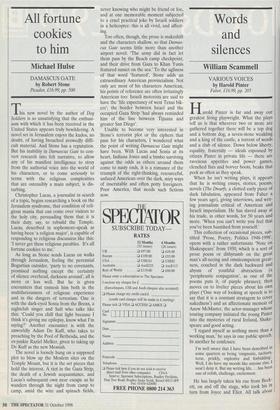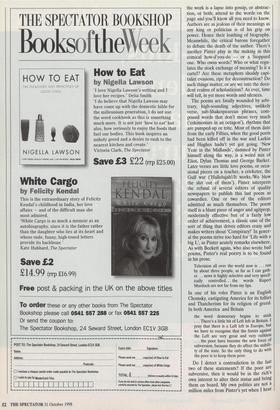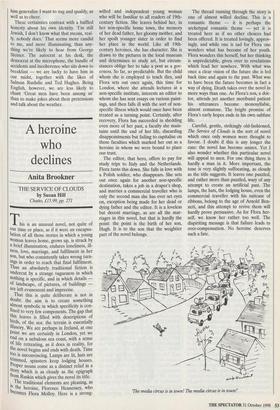Words and silences
William Scammell
VARIOUS VOICES by Harold Pinter Faber, £16.99, pp. 205 Harold Pinter is far and away our greatest living playwright. What the plays tell us is that wherever two or more are gathered together there will be a top dog and a bottom dog, a seven-stone weakling and a king of the castle, a torrent of words and a club of silence. Down below liberty, equality, fraternity — ideals espoused by citizen Pinter in private life — there are ravenous appetites and power games, clenched fists and bower boots, beaks that peck as often as they speak. When he isn't writing plays, it appears that he is writing essays, stories, poems, novels (The Dwarfs, a clotted early piece of dark fabulation, appeared from Faber a few years ago), giving interviews, and writ- ing journalism critical of American and Israeli imperialism. He has slaved away at his trade, in other words, for 50 years and more. 'When you can't write you feel that you've been banished from yourself.'
This collection of occasional pieces, sub- titled 'Prose, Poetry, Politics 1948-1998', opens with a rather unfortunate 'Note on Shakespeare' from 1950, which is a sort of prose poem or dithyramb on the great man's all-seeing and omnicompetent great- ness, couched in the dark backward and abysm of youthful abstraction (a `periphrastic conjugation', as one of the poems puts it, of purple phrases); then moves on to livelier pieces about his own plays. (`One way of looking at speech is to say that it is a constant stratagem to cover nakedness') and an affectionate memoir of Anew McMaster, the actor-manager whose touring company initiated the young Pinter into the mysteries of rural Ireland, Shake- speare and good acting. `I regard myself as nothing more than a working man,' he says in one public speech. In another he confesses: I'm well aware that I have been described in some quarters as being 'enigmatic, taciturn, terse, prickly, explosive and forbidding • Well, I do have my moods like anyone else, I won't deny it. But my writing life. . . has been one of relish, challenge, excitement.
He has largely taken his cue from Beck- ett, on and off the stage, who took his in turn from Joyce and Eliot. All talk about the work is a lapse into gossip, or abstrac- tion, or both; attend to the words on the page and you'll know all you need to know. Authors are as jealous of their meanings as any king or politician is of his grip on power. Hence their loathing of biography. Meanwhile, the critical barons foregather to debate the death of the author. There's another Pinter play in the making in this comical how-d'you-do — or a Stoppard one. Who owns words? Who or what regu- lates the stock exchange of meaning? Is it a cartel? Are these metaphors shoddy capi- talist evasions, ripe for deconstruction? Do such things matter, or are we into the deca- dent realms of scholasticism? As ever, time will tell, in yet more words and silences.
The poems are fatally wounded by arbi- trary, high-sounding adjectives, unlikely verse, sub-Shakespearean phrases, com- pound words that don't mean very much (`eslcimostars in an octagon'), rhythms that are pumped-up or trite. Most of them date from the early Fifties, when the good poets had been killed off in the war and Larkin and Hughes hadn't yet got going. 'New Year in the Midlands', damned by Pinter himself along the way, is a weird mix of Eliot, Dylan Thomas and George Barker. Later verses are little love poems, or occa- sional pieces on a teacher, a cricketer, the Gulf war (`HallelujahVIt works./We blew the shit out of them'). Pinter interprets the refusal of several editors of quality newspapers to publish this last poem as cowardice. One or two of the editors admitted as much themselves. The poem itself is a blunt piece of anger and agitprop, moderately effective but of a fairly low order of achievement, a classic case of the sort of thing that drives editors crazy and makes writers shout `Conspiracy!' In gener- al the poems strive too hard for 'Life with a big L', as Pinter acutely remarks elsewhere. As with Beckett again, who also wrote bad poems, Pinter's real poetry is to be found in his prose.
Television all over the world now is ... run by about three people, as far as I can gath- er... news is highly selective and very specif- ically controlled... the words Rupert Murdoch are not far from my lips.
In one of his roles Pinter is an English Chomsky, castigating America for its follies and Thatcherism for its religion of greed. In both America and Britain the word democracy begins to stink ... There's a little bit of Left left in Britain. I pray that there is a Left left in Europe, but we have to recognise that the forces against the Left are very great and very ruthless ... the poor have become the new force of subversion, because they do affect the stabili- ty of the state. So the only thing to do with the poor is to keep them poor.
Do I detect a contradiction in the last two of these statements? If the poor are subversive, then it would be in the rich's own interest to alter their status and bring them on board. My own politics are not a million miles from Pinter's yet when I hear him generalise I want to nag and qualify, as well as to cheer.
These certainties contrast with a baffled honesty about his own identity. 'I'm still Jewish, I don't know what that means, real- ly, nobody does.' That seems more candid to me, and more illuminating, than any- thing we're likely to hear from George Steiner. The autocrat at his desk, the democrat at the microphone, the bundle of accidents and incoherence who sits down to breakfast — we are lucky to have him in our midst, together with the likes of Salman Rushdie and Ted Hughes. Being English, however, we are less likely to chant 'Great men have been among us' than to make jokes about their pretensions and talk about the weather.




















































































 Previous page
Previous page